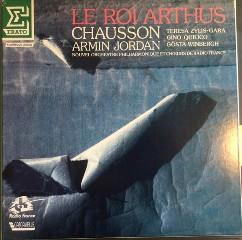Ernest Chausson – Le Roi Arthus (1987)
Ernest Chausson – Le Roi Arthus (1987)

Acte I 1-1 Prélude 3:22 - Tableau I 1-2 Scène 1 18:39 - Tableau II 1-3 Scène 2 3:44 1-4 Scène 3 9:41 1-5 Scène 4 5:41 Acte II 2-1 Prélude 3:45 - Tableau I 2-2 Scène 1 2:07 2-3 Scène 2 6:08 2-4 Scène 3 26:30 - Tableau II 2-5 Scène 4 6:50 2-6 Scène 5 10:30 2-7 Scène 6 2:15 Acte III 3-1 Prélude 2:38 - Tableau I 3-2 Scène 1 5:32 3-3 Scène 2 13:26 3-4 Scène 3 12:09 - Tableau II 3-5 Scène 4 3:03 3-6 Scène 5 13:01 3-7 Scène 6 12:34 Arthus - Gino Quilico (baritone) Guenièvre - Teresa Zylis-Gara (soprano) Lancelot - Gösta Winbergh (tenor) Lyonnel - Gérard Friedmann (tenor) Merlin - Gilles Cachemaille (baritone) Mordred - René Massis (baritone) Allan - François Loup (baritone) Un laboureur - Thierry Dran (tenor) Un chevalier - René Schirrer (baritone) Un écuyer - Alexander Laitter (tenor) Soldat 1 & 2 - Michel Focquenoy (tenor) Soldat 3 - Francis Dudziak (baritone) Soldat 4 - René Schirrer (baritone) Chœurs de Radio France Nouvel Orchestre Philharmonique Armin Jordan - conductor
This comparatively rare opera has received very few recordings over the years and this is its only recent incarnation albeit dating back to 1986, almost a quarter of a century ago. It has aged well with the mesmeric and passionate conducting of the Swiss, Armin Jordan very much in harmony with Chausson's Wagnerian music.
King Arthur obviously makes an intriguing setting for any opera and the arias and ensembles are extremely enjoyable to listen to. It is a fine work which deserves resurrection on CD although the libretto and sumptuous booklet which made up the former Erato set are long gone. Otherwise a real snip at such a price. ---Gerald Fenech, classical.net
Le Roi Arthus, Chausson’s only completed opera, took the composer 10 years to write and was not premiered until four years after his death. He feared Wagner’s influence for a while, then Debussy’s. In fact, he didn’t escape; his opera’s chromaticism and orchestration–the dark string writing, massed brass, and bass clarinets, for example–show clear influences of Wagner. Indeed, even the plot, focusing on the part of the Arthurian legend involved with the illicit affair between Guinevere and Lancelot and the King’s idealism and resignation in the face of such treason, is more than a bit reminiscent of Tristan. There is a love duet for Lancelot and Guinevere that’s interrupted by a warning from Lancelot’s Squire, à la Brangaene, that dawn is approaching; the “Tristan chord” appears more than once. All that’s missing are Leitmotifs to complete the Wagnerian homage, and there are arguably a couple of them as well. Careful listening will bring others to mind, as in the first scene’s almost exact quotes from Massenet’s Esclarmonde (Chausson studied under Massenet).
But Chausson, it turns out, is Chausson and not a sum of everyone else’s parts; after a while the influences take a back seat and something new and powerful is created. You can’t help but be impressed–or notice that the libretto, also by Chausson, does not take the same view of the deceiving lovers as does Tristan: the clear hero in Le Roi Arthus is the title character. The lovers’ almost maniacally passionate exchanges may fire the emotions, but Arthur remains lofty, and he is the figure to care for in this opera.
This is not the work’s first recording: Erato released a fine performance under Armin Jordan in the late ’80s, starring Gino Quilico, Gosta Winbergh, and Teresa Zylis-Gara, and it remains the recording of choice. Quilico, a light baritone, sang Arthur with grand focus of purpose and impeccable diction; Zylis-Gara was the soul of both seduction and womanliness and her tone was beautiful. Winbergh yelled more than he ought to have as Lancelot, and his French pronunciation was noticeably bad, but he was passionate.
In this new recording, tenor Simon O’Neill also has some problems with Lancelot’s cruel tessitura and sustained need for big volume, but he inflects better and gives us a fine portrait as the crazy-in-love, full-of-remorse knight. Susan Bullock’s soprano is no match for Zylis-Gara’s as Guinevere. Not only is it unsteady and essentially unlovely, but she sounds too matronly. This helps only in her denunciation of Lancelot in their second-act duet, which is very potent, and in her more selfish moments. In short, she lacks allure. Andrew Schroeder, though possibly wanting Quilico’s elegance of line and principle, gets better as the opera progresses, and his splendid, big baritone fills the role by Act 3.
In lesser roles, François Le Roux sings Merlin’s music with gravity and Garret Sorenson brings lovely tone to the role of Lionel, Lancelot’s squire. The same can be said for Andrew Kennedy as a Plowman, who sings a Berlioz-like offstage song in the second act. The veteran Donald McIntyre sings the role of Guinevere’s old squire, and indeed, he sounds old.
The BBC Symphony is a better group than Jordan’s Nouvel Orchestre Philharmonique, and it does the rich-textured score absolute justice. Leon Botstein leads the performance with tempos in the first two acts slower than Jordan’s, and not to any particular advantage; however, he and the engineers give us a crystal-clear view of the music. The choral work is glorious–the women’s chorus in the last act provides one of the score’s most transcendent moments, and the Apollo Voices are simply otherworldly. If you can’t locate the Erato recording, this present one will certainly give you a fine feel for this unique work–but Jordan’s Zylis-Gara and Quilico embody their roles in a way that their counterparts do not. ---Robert Levine, classicstoday.com
download (mp3 @320 kbs):
yandex mediafire ulozto bayfiles








